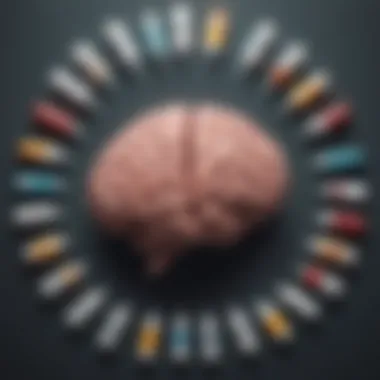Unveiling the Wide Array of Medications Prescribed for Bipolar Disorder: A Comprehensive Guide


Understanding Mental Health and Well-being
Bipolar disorder is a complex mental health condition that requires a nuanced approach to treatment. It is essential to comprehend the intricacies of mental health to navigate the challenges associated with bipolar disorder effectively. Understanding mental health involves recognizing the various components that contribute to psychological well-being, such as emotional stability, cognitive function, and social interactions. By delving into the fundamentals of mental health, individuals can gain insight into how different factors impact their overall well-being.
What is Mental Health?
Mental health refers to a person's emotional, psychological, and social well-being. It encompasses how individuals think, feel, and behave in various situations. A sound mental health state enables individuals to cope with stress, navigate life's challenges, maintain healthy relationships, and make informed decisions. It is crucial to address mental health concerns promptly to prevent the escalation of more severe issues.
The Importance of Prioritizing Mental Well-being
Prioritizing mental well-being involves actively engaging in practices and adopting strategies that promote emotional resilience and psychological balance. By recognizing the significance of mental well-being, individuals can adopt a proactive approach towards addressing mental health issues, seeking appropriate support when needed, and maintaining a healthy lifestyle conducive to overall well-being.
Common Mental Health Challenges and Disorders
In today's fast-paced and demanding world, individuals face various mental health challenges and disorders. From anxiety and depression to mood disorders like bipolar disorder, the prevalence of mental health conditions underscores the importance of fostering a supportive environment that destigmatizes seeking help and promotes open discussions about mental health.
Stay tuned for the next section where we will explore strategies for enhancing mental health and well-being in individuals navigating bipolar disorder.
Introduction
Bipolar disorder is a complex mental health condition that impacts millions of individuals worldwide. Understanding the nuances of this disorder is crucial for effective management and treatment. This article aims to provide a comprehensive overview of the medications commonly prescribed for bipolar disorder, shedding light on their roles in symptom control and overall well-being.
Understanding Bipolar Disorder
Definition and Symptoms
Bipolar disorder is characterized by extreme mood swings, including manic highs and depressive lows. These mood shifts can significantly disrupt daily functioning and quality of life for those affected. By discussing the definition and symptoms of bipolar disorder, we can delve into the fundamental aspects of this condition, highlighting the distinct behavioral patterns and emotional states that define it.
Types of Bipolar Disorder
There are several types of bipolar disorder, including Bipolar I, Bipolar II, and Cyclothymic Disorder. Each type differs in the severity and duration of mood episodes experienced by individuals. Understanding the variations in these types is essential for accurate diagnosis and treatment planning, allowing healthcare providers to tailor interventions to meet the specific needs of each patient.
Prevalence and Impact
Bipolar disorder affects approximately 2.8% of the adult population in the United States. The condition can have a profound impact on various aspects of an individual's life, including relationships, work performance, and self-esteem. By exploring the prevalence and impact of bipolar disorder, we can gain insight into the widespread nature of this illness and the challenges individuals face in managing its symptoms.
Importance of Medication in Treatment
Role of Medication


Medications play a crucial role in the treatment of bipolar disorder, helping to stabilize mood fluctuations and reduce the frequency and intensity of mood episodes. By understanding the role of medication in managing bipolar disorder, individuals can take proactive steps towards symptom control and long-term stability.
Benefits and Challenges
The use of medications in bipolar disorder treatment offers numerous benefits, such as symptom relief, improved functioning, and enhanced quality of life. However, there are also challenges associated with medication therapy, including side effects, adherence issues, and finding the right medication regimen. Exploring these benefits and challenges is vital for empowering individuals to make informed decisions about their treatment.
Compliance and Adherence
Achieving optimal outcomes in bipolar disorder treatment requires strict adherence to medication regimens prescribed by healthcare providers. However, maintaining compliance with medication can be challenging for some individuals due to various factors, including side effects, forgetfulness, and stigma. By addressing the importance of compliance and adherence, we can underscore the significance of medication continuity in managing bipolar symptoms effectively.
Types of Medications
In this domain of bipolar disorder treatment, understanding the various classes of medications is paramount. The significance lies in how these medications target different aspects of the disorder, ranging from stabilizing mood to alleviating symptoms. By delving into mood stabilizers, antipsychotics, antidepressants, and anti-anxiety medications, individuals can grasp the diverse pharmacological approaches utilized in managing bipolar disorder. Each class of medication brings its unique benefits and considerations, contributing to a holistic treatment approach.
Mood Stabilizers
Mood stabilizers play a crucial role in managing bipolar disorder by helping to regulate mood swings and prevent episodes of mania or depression. One prominent mood stabilizer is Lithium, known for its effectiveness in stabilizing mood and reducing the risk of manic episodes. Despite requiring careful monitoring of blood levels due to its narrow therapeutic window, Lithium remains a popular choice for its proven efficacy in managing bipolar symptoms. On the contrary, while Lithium offers substantial benefits, it may lead to side effects such as tremors or kidney issues in some individuals, necessitating close medical supervision.
Moving onto Valproate, another commonly prescribed mood stabilizer, it is valued for its versatility in treating various phases of bipolar disorder. Valproate's key characteristic lies in its rapid onset of action, making it beneficial for individuals requiring immediate symptom relief. However, users of Valproate may experience side effects like gastrointestinal disturbances or weight gain, highlighting the importance of weighing its benefits against potential drawbacks.
Lastly, Carbamazepine is a mood stabilizer known for its efficacy in managing rapid cycling bipolar disorder. Its unique feature lies in its ability to target specific symptoms like agitation or impulsivity, offering tailored treatment for individuals with these issues. While Carbamazepine's advantages include reducing the frequency of mood episodes, caution is warranted due to its potential side effects such as dizziness or skin rashes, necessitating close monitoring during therapy.
Antipsychotics
Antipsychotics play a vital role in treating bipolar disorder by addressing symptoms of psychosis, agitation, and severe mania. Olanzapine, a prominent antipsychotic, is favored for its efficacy in managing acute manic episodes and stabilizing mood. Olanzapine's key characteristic lies in its rapid symptom relief, making it a preferred choice during manic crises. However, individuals using Olanzapine may experience adverse effects like weight gain or sedation, underscoring the need for careful monitoring during treatment.
Moving on to Risperidone, another antipsychotic commonly used in bipolar disorder, its contribution lies in managing both manic and depressive symptoms effectively. Risperidone's key characteristic includes its ability to target mood fluctuations and psychotic features simultaneously, offering a comprehensive approach to symptom management. Users of Risperidone may encounter side effects like insomnia or dizziness, necessitating regular consultation with healthcare providers to optimize dosage and minimize adverse effects.
Lastly, Quetiapine stands out as an antipsychotic with efficacy in treating both mania and depression in bipolar disorder. Its unique feature lies in its sedative properties, aiding individuals in managing sleep disturbances often associated with mood episodes. While Quetiapine can be advantageous in promoting stable sleep patterns, users should be vigilant about potential side effects like metabolic changes or daytime drowsiness, warranting continuous evaluation by healthcare professionals.
Antidepressants
Antidepressants are utilized in bipolar disorder to manage depressive symptoms that may arise alongside manic or hypomanic episodes. SSRIs, a class of antidepressants, are valued for their selective action on serotonin reuptake, improving mood and reducing feelings of sadness or hopelessness. The key characteristic of SSRIs lies in their ability to elevate mood without significant sedative effects, making them suitable for individuals experiencing predominantly depressive symptoms. However, users of SSRIs should be cautious about potential side effects such as gastrointestinal disturbances or sexual dysfunction, necessitating open communication with healthcare providers.
Shifting focus to SNRIs, another class of antidepressants, their contribution to bipolar disorder lies in targeting both serotonin and norepinephrine reuptake to enhance mood regulation. SNRIs' key characteristic includes their effectiveness in managing symptoms like fatigue or lack of concentration often seen in depression. Despite their benefits in addressing a wide range of depressive symptoms, users should be aware of potential side effects like hypertension or insomnia, emphasizing the importance of ongoing monitoring by healthcare professionals.
Lastly, Tricyclic Antidepressants offer a historical perspective on antidepressant therapy for bipolar disorder. Their key characteristic includes targeting multiple neurotransmitters to alleviate symptoms of depression, despite being less commonly prescribed in current clinical practice. The unique feature of Tricyclic Antidepressants lies in their potency in addressing severe depressive symptoms; however, users should exercise caution due to their potential side effects such as anticholinergic effects or orthostatic hypotension, necessitating close medical supervision.
Anti-Anxiety Medications


Anti-anxiety medications play a role in managing anxiety symptoms that may accompany bipolar disorder, promoting a sense of calm and reducing stress levels. Benzodiazepines are commonly prescribed for their anxiolytic properties, offering rapid relief from symptoms like panic attacks or anxiety. The key characteristic of Benzodiazepines lies in their ability to enhance the effects of the neurotransmitter GABA, inducing relaxation and reducing anxiety levels effectively. However, users of Benzodiazepines should be cautious about potential side effects like drowsiness or memory impairment, necessitating careful monitoring and judicious use under medical guidance.
Considering Buspirone, it serves as an alternative to Benzodiazepines by offering anxiolytic effects without the risk of dependency or tolerance. Buspirone's key characteristic includes its gradual onset of action, making it suitable for long-term management of anxiety symptoms associated with bipolar disorder. Its unique feature lies in its non-sedating nature, allowing individuals to address anxiety without experiencing drowsiness, a common concern with other anti-anxiety medications. Despite its advantages, users may experience side effects like dizziness or nausea, requiring regular assessment by healthcare providers for optimal treatment outcomes.
Lastly, Hydroxyzine offers an additional option for managing anxiety symptoms in bipolar disorder by promoting relaxation and reducing nervousness. Its key characteristic lies in its sedating effect, making it beneficial for individuals experiencing anxiety-related sleep disturbances. The unique feature of Hydroxyzine includes its rapid onset of action, providing swift relief from acute anxiety episodes. Users of Hydroxyzine should be wary of potential side effects like dry mouth or blurred vision, underscoring the need for consistent monitoring to ensure treatment efficacy and safety.
Side Effects and Considerations
In discussing medications prescribed for bipolar disorder, delving into the side effects and considerations is paramount. Understanding the potential effects and precautions associated with these medications is crucial for individuals managing bipolar disorder. By addressing the side effects and considerations comprehensively, patients can make informed decisions about their treatment plans.
Common Side Effects
Weight Gain
Weight gain is a prevalent side effect of certain medications used to manage bipolar disorder. The propensity of these drugs to cause weight gain can significantly impact the individual's physical health and overall well-being. While the exact mechanisms leading to weight gain vary, the implications are noteworthy in the context of treating bipolar disorder. Patients may need to balance the benefits of these medications with the potential weight-related concerns, requiring careful monitoring and management.
Sedation
Sedation, a common side effect of many bipolar medications, can affect individual daily functioning and quality of life. The inherent sedative properties of these drugs influence patients' cognitive abilities and energy levels, impacting their productivity and engagement in daily activities. As sedation can vary in intensity and duration, understanding its effects is vital for individuals managing bipolar disorder to navigate treatment challenges effectively.
Metabolic Changes
Metabolic changes induced by certain medications present noteworthy considerations for individuals with bipolar disorder. These alterations in metabolism can manifest as disruptions in weight, cholesterol levels, and blood sugar regulation, necessitating close monitoring and proactive management. The impact of metabolic changes extends beyond physical health, affecting overall treatment efficacy and long-term well-being.
Long-Term Effects
Risk of Cardiovascular Issues
The risk of cardiovascular issues associated with some bipolar medications underscores the importance of monitoring and addressing long-term health outcomes. These potential cardiovascular effects can include changes in heart rate, blood pressure, and overall vascular health. Patients and healthcare providers must collaborate to mitigate these risks, ensuring a balanced approach to medication management that prioritizes cardiovascular wellness.
Impact on Cognitive Function
Medications prescribed for bipolar disorder can have varying effects on cognitive function, influencing memory, concentration, and decision-making abilities. Understanding how these drugs impact cognitive function is essential for individuals striving to maintain mental acuity and clarity amidst treatment. By evaluating and addressing the cognitive impact of medications, patients can optimize their treatment outcomes and cognitive well-being.
Potential for Tolerance
The development of tolerance to bipolar medications poses challenges for long-term treatment efficacy and patient outcomes. Individuals may experience a diminished response to their prescribed medications over time, necessitating dosage adjustments or medication changes. Recognizing the potential for tolerance enables healthcare providers and patients to adapt treatment strategies proactively, ensuring continued symptom management and therapeutic benefits.
Medication Management


In delving into the realm of managing medications for bipolar disorder, it becomes apparent that meticulous attention to detail is paramount. The process of medication management involves a complex interplay of factors, ranging from initial prescription to long-term monitoring. Firstly, understanding the nuances of each medication prescribed is crucial; this includes comprehending not only the benefits but also the potential challenges and side effects that may arise. Moreover, ensuring strict compliance and adherence to the prescribed regimen is essential for optimal treatment outcomes. Patients need to be diligent in following their psychiatrist's guidance and attending routine check-ups.
Consulting a Psychiatrist
Importance of Regular Visits
One of the cornerstone aspects of medication management in bipolar disorder treatment is the significance of regular visits to a psychiatrist. These scheduled appointments serve as critical touchpoints for monitoring the patient's progress, adjusting dosages as needed, and addressing any emerging concerns. Regular visits facilitate a close examination of the medication efficacy and help in detecting early signs of adverse effects. By fostering an open dialogue between the patient and psychiatrist, these consultations promote a collaborative approach to treatment, enhancing the overall quality of care.
Monitoring and Adjusting Dosages
A fundamental element of effective medication management is the meticulous monitoring and adjustment of dosages. Psychiatrists closely track the patient's response to the prescribed medications, making necessary modifications to achieve optimal therapeutic outcomes. This process involves careful evaluation of the individual's symptoms, side effects, and overall well-being to tailor the dosage for maximum efficacy. By regularly reviewing and fine-tuning the medication regimen, psychiatrists can fine-tune the treatment plan to address the dynamic nature of bipolar disorder.
Discussing Concerns and Side Effects
Within the realm of medication management, open communication regarding concerns and side effects plays a pivotal role in ensuring patient comfort and safety. Patients are encouraged to candidly express any troubling symptoms or adverse reactions they may experience while on medication. This proactive approach enables psychiatrists to proactively address issues, modify the treatment plan if necessary, and mitigate potential risks. By fostering a transparent dialogue about concerns and side effects, both patients and psychiatrists can collaborate effectively towards optimizing treatment outcomes.
Combination Therapy
Rationale for Combination
The rationale behind pursuing combination therapy in bipolar disorder treatment is rooted in the premise of addressing diverse symptoms through complementary mechanisms of action. By combining different classes of medications, such as mood stabilizers and antipsychotics, psychiatrists aim to target various aspects of the disorder simultaneously. This multifaceted approach not only enhances symptom management but also reduces the risk of drug resistance and enhances overall treatment efficacy.
Benefits and Risks
When considering the implementation of combination therapy, it is crucial to weigh the potential benefits against the inherent risks. While combining medications can offer synergistic effects and improved symptom control, there is also the risk of heightened side effects or drug interactions. Psychiatrists must carefully assess the individual's response to combination therapy, closely monitoring for any adverse reactions or complications to ensure the patient's safety and well-being.
Interactions and Monitoring
An integral aspect of implementing combination therapy in bipolar disorder treatment is the thorough evaluation of potential drug interactions and diligent monitoring. Psychiatrists need to consider the pharmacological compatibility of the prescribed medications to prevent adverse reactions. Regular monitoring of the patient's response to combination therapy is vital in detecting any signs of intolerance or inefficacy promptly. By prioritizing comprehensive interactions screening and vigilant monitoring, psychiatrists can optimize the benefits of combination therapy while minimizing potential risks.
Conclusion
Achieving Stability and Wellness
Individualized Treatment Approach
Exploring the concept of an individualized treatment approach within the realm of bipolar disorder treatment is paramount. Tailoring treatment plans to suit the unique needs and responses of each individual not only improves therapeutic outcomes but also fosters a sense of empowerment and autonomy in the management of one's mental health. The key characteristic of this approach lies in its personalized nature, recognizing that what works for one person may not necessarily work for another. By customizing treatment strategies based on factors like symptom severity, medication tolerance, and lifestyle considerations, healthcare providers can optimize the efficacy of interventions. While the individualized treatment approach offers tailored solutions, it also requires careful monitoring and adjustment to ensure optimal results, making it a prudent choice in the context of this article where the focus is on comprehensive and individual-centric care.
Lifestyle Factors
Considering the impact of lifestyle factors in promoting stability and wellness for individuals with bipolar disorder is imperative. Lifestyle choices encompass a broad spectrum of influences, including diet, exercise, sleep patterns, stress management, and social interactions. These factors play a pivotal role in modulating mood fluctuations, medication responses, and overall health outcomes. Highlighting the significance of adopting a healthy lifestyle not only complements pharmacological interventions but also serves as a foundational element in sustaining long-term well-being. The unique feature of lifestyle factors is their capacity to serve as natural complements to medical therapies, offering individuals a holistic approach to managing their condition. While lifestyle modifications may require consistent effort and adjustment, their potential benefits in enhancing treatment outcomes and reducing symptom severity make them a valuable component of the treatment landscape discussed in this article.
Support Systems
Examining the role of support systems in the journey towards stability and wellness elucidates the interpersonal dynamics that influence treatment outcomes for individuals with bipolar disorder. Support systems encompass a network of individuals, including family members, friends, healthcare providers, and community resources, who offer practical assistance, emotional guidance, and encouragement throughout the treatment process. The key characteristic of effective support systems lies in their ability to provide a collaborative and nurturing environment that fosters resilience and resourcefulness in individuals facing mental health challenges. By establishing robust support networks, individuals can cultivate a sense of belonging, reduce feelings of isolation, and access valuable resources that enhance treatment adherence and resilience. While engaging with support systems may require vulnerability and trust, the potential advantages of cultivating a strong support network in promoting stability and well-being underscore its relevance in the context of this article, where the emphasis is on empowering individuals to navigate the complexities of bipolar disorder with resilience and efficacy.















